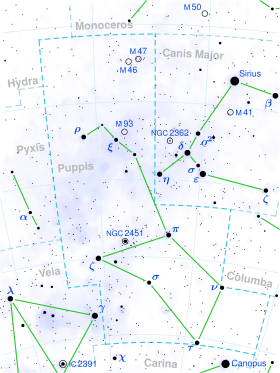HD 61330
Appearance
| Observation data Epoch J2000 Equinox J2000 | |
|---|---|
| Constellation | Puppis |
| Right ascension | 07h 37m 22.10978s[1] |
| Declination | −34° 58′ 06.7109″[1] |
| Apparent magnitude (V) | 4.53[2] |
| Characteristics | |
| Spectral type | B8IV[3] |
| U−B color index | -0.31[2] |
| B−V color index | -0.09[2] |
| Astrometry | |
| Radial velocity (Rv) | +24.00[4] km/s |
| Proper motion (μ) | RA: -14.21[1] mas/yr Dec.: +16.32[1] mas/yr |
| Parallax (π) | 9.05 ± 0.40 mas[1] |
| Distance | 360 ± 20 ly (110 ± 5 pc) |
| Absolute magnitude (MV) | -0.68[5] |
| Details | |
| Mass | 3.59[6] M☉ |
| Luminosity | 270[6] L☉ |
| Temperature | 11,480[6] K |
| Rotational velocity (v sin i) | 56[6] km/s |
| Other designations | |
| Database references | |
| SIMBAD | data |
HD 61330 (f Puppis) is a class B8IV[3] (blue subgiant) star in the constellation Puppis. Its apparent magnitude is 4.53[2] and it is approximately 360 light years away based on parallax.[1]
It is a multiple star, with a secondary component C, with magnitude 6.07 in an 81-year orbit with eccentricity 0.64.[7] Another closer component, B, has been reported at 6.1 magnitude and 0.1" separation, but subsequent observers have repeatedly failed to confirm it.[8]
References
[edit]- ^ a b c d e f Van Leeuwen, F. (2007). "Validation of the new Hipparcos reduction". Astronomy and Astrophysics. 474 (2): 653–664. arXiv:0708.1752. Bibcode:2007A&A...474..653V. doi:10.1051/0004-6361:20078357. S2CID 18759600. Vizier catalog entry
- ^ a b c d Ducati, J. R. (2002). "VizieR Online Data Catalog: Catalogue of Stellar Photometry in Johnson's 11-color system". CDS/ADC Collection of Electronic Catalogues. 2237. Bibcode:2002yCat.2237....0D.
- ^ a b Hoffleit, D.; Warren, W. H. (1995). "VizieR Online Data Catalog: Bright Star Catalogue, 5th Revised Ed. (Hoffleit+, 1991)". VizieR On-line Data Catalog: V/50. Originally Published in: 1964BS....C......0H. 5050. Bibcode:1995yCat.5050....0H.
- ^ Kharchenko, N.V.; Scholz, R.-D.; Piskunov, A.E.; Röser, S.; Schilbach, E. (2007). "Astrophysical supplements to the ASCC-2.5: Ia. Radial velocities of ~55000 stars and mean radial velocities of 516 Galactic open clusters and associations". Astronomische Nachrichten. 328 (9): 889. arXiv:0705.0878. Bibcode:2007AN....328..889K. doi:10.1002/asna.200710776. S2CID 119323941.
- ^ Anderson, E.; Francis, Ch. (2012). "XHIP: An extended hipparcos compilation". Astronomy Letters. 38 (5): 331. arXiv:1108.4971. Bibcode:2012AstL...38..331A. doi:10.1134/S1063773712050015. S2CID 119257644. Vizier catalog entry
- ^ a b c d Zorec, J.; Royer, F. (2012). "Rotational velocities of A-type stars". Astronomy & Astrophysics. 537: A120. arXiv:1201.2052. Bibcode:2012A&A...537A.120Z. doi:10.1051/0004-6361/201117691. S2CID 55586789. Vizier catalog entry
- ^ Malkov, O. Yu.; Tamazian, V. S.; Docobo, J. A.; Chulkov, D. A. (2012). "Dynamical masses of a selected sample of orbital binaries". Astronomy & Astrophysics. 546: A69. Bibcode:2012A&A...546A..69M. doi:10.1051/0004-6361/201219774. Vizier catalog entry
- ^ Mason, Brian D.; Wycoff, Gary L.; Hartkopf, William I.; Douglass, Geoffrey G.; Worley, Charles E. (2001). "The 2001 US Naval Observatory Double Star CD-ROM. I. The Washington Double Star Catalog". The Astronomical Journal. 122 (6): 3466. Bibcode:2001AJ....122.3466M. doi:10.1086/323920. Vizier catalog entry

